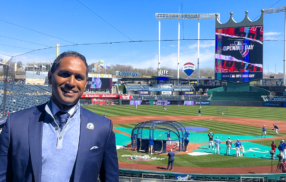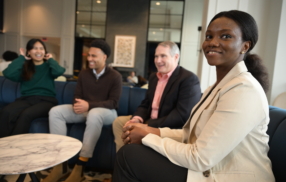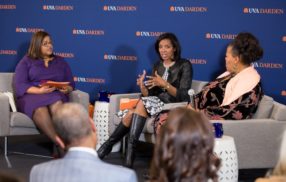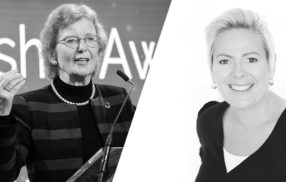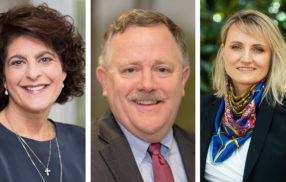Leadership Unscripted: Addressing the World’s Biggest Problems, From Individual to Global Scale
By Jen A. Miller
Issues like global poverty and hunger, racial injustice, human trafficking and the opioid crisis are wreaking havoc across large stretches of the world, and may seem insurmountable. How should one consider approaching worldwide problems?
At a recent Leadership Unscripted Speaker Series talk hosted by the University of Virginia Darden School of Business, Baroness Philippa Stroud, CEO of the Legatum Institute and a Member of Parliament in the United Kingdom, spoke with UVA Professor Lucy Bassett about confronting social challenges, from the individual level up through world-wide efforts to make real global change.
Both Stroud and Bassett have worked on the ground level on these issues, Stroud in Hong Kong and Macau with substance abuse disorder communities, and Bassett in Guatemala while with the Peace Corps.
They feel it informs their work today. Stroud said that’s especially true in Parliament where, as a member of the House of Lords, she reviews legislation already passed by the House of Commons. “When I look at legislation, in a way I’ve got all their faces in my mind,” said Stroud.
Bassett agreed. “I often think of the kids I used to make tortillas with, and herd the sheep, and think through what this would mean to them.”
However, making sure those voices are heard isn’t as easy as having every single potential policy maker visit another community. While taking tours of affected areas or even staying overnight with families that need help can give those policy makers a view into those lives, it doesn’t embed them in that world. Bassett said it also raises concerns of “inappropriate voyeuristic tourism.”
One potential model that’s worked is sending members of parliament on a weeklong stay in another community, said Stroud. In exchange, a member of the affected community then comes to Parliament for a week “to see some of the challenges of policy making and the legislative process,” she said. Enjoining a panel to work on a problem long term can also help, because “longer term exposure builds the meaning,” Bassett added.
They also spoke of the challenge of fighting poverty, starting with how exactly poverty is defined. Setting a poverty line at 60 percent of the country’s median household income (as the UK has previously done) means that the amount of people living in poverty changes with the economy. If the economy booming, more people will technically live in poverty because the median income goes up. If the economy crashes, fewer people will be below the line because the line itself goes down.
In 2016, Stroud founded the Social Metric Commission to create a new UK poverty measure to replace the 60 percent mark. They looked at how much a household needs in terms of income to survive but also lived experience factors like length of time they were in poverty, education, skills, mental health and debt.
She found that, by talking to leaders on the left and right of the political divide, they all agreed on some of the same things. “It can’t be beyond the wit of man to actually bring that together and create something we can rally around,” she said.
When thinking internationally about pursuing social change, Bassett brought up the importance of not telling other countries what they need to do, especially when doing so would be a perpetuation of colonialization.
“They’re going to set their own pathway. They’re going to chart their own direction and create their own national plan and take charge of their future,” Stroud said. “Even when they’re the recipient of aid, they don’t let the aid dictate what they’re going to do.”
They spoke about another pressing global issue: how climate change will continue to turn more people into climate refugees.
During World War II, one of Stroud’s family members evacuated to Canada and “may well be alive today because Canada took him in,” she said. “That story is replicated thousands of times throughout the UK, how our own people have sought safety and security and then come back. That is the story across Western Europe and yet [people] seem to have forgotten that this can help to us too.”
Stroud anticipates that, overall, the private sector will play a role in addressing these global issues because that’s where innovation lives. “If you allow the private sector to really thrive and flourish, then they will address the challenges of climate change, and all those challenges you just laid out,” she said, and called on the Darden community to recognize their potential role in these changes “The Darden alumni listening to this will be the people who will solve some of our biggest challenges.”
Listen to a podcast recording of the event.
The University of Virginia Darden School of Business prepares responsible global leaders through unparalleled transformational learning experiences. Darden’s graduate degree programs (MBA, MSBA and Ph.D.) and Executive Education & Lifelong Learning programs offered by the Darden School Foundation set the stage for a lifetime of career advancement and impact. Darden’s top-ranked faculty, renowned for teaching excellence, inspires and shapes modern business leadership worldwide through research, thought leadership and business publishing. Darden has Grounds in Charlottesville, Virginia, and the Washington, D.C., area and a global community that includes 18,000 alumni in 90 countries. Darden was established in 1955 at the University of Virginia, a top public university founded by Thomas Jefferson in 1819 in Charlottesville, Virginia.
Press Contact
Molly Mitchell
Senior Associate Director, Editorial and Media Relations
Darden School of Business
University of Virginia
MitchellM@darden.virginia.edu


